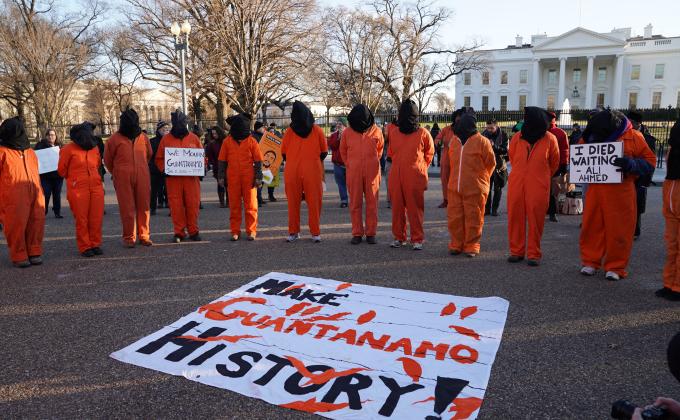The previous op-ed in this trilogy looked at how courts in Syria and Iraq can bring terrorists to justice mainly on terrorist charges in their post-conflict settings. This op-ed will examine how foreign national courts can prosecute terrorist crimes that have been committed in Syria and Iraq. These crimes can constitute war crimes, crimes against humanity or genocide. Foreign courts can assert jurisdiction on the condition that a criminal offence is committed by their nationals (active nationality principle), against their nationals (passive nationality principle), or that a criminal offence has been committed on their territory (territoriality principle). This would also include preparatory acts of terrorism, such as planning an attack or travelling to Syria and Iraq. Finally, courts can exercise universal jurisdiction over certain serious crimes regardless of the place where they were committed or the nationality of the perpetrator or victims.
Several courts have tried cases on the basis of the active nationality principle or territoriality principle for terrorist offences or for crimes that qualify as international crimes. These cases are against their own “foreign” fighters, but could also be against persons who have entered their country as refugees and in some cases have obtained their nationality. Europe has received the highest number of asylum seekers from Syria and Iraq. From January until October 2017, Europe received 339.000 applications from Syria and 156.000 applications from Iraq. Due to the presence of a large number of refugees and asylum seekers, several European prosecutors are seeking help from refugees to investigate crimes that have been committed in Syria and Iraq. Some of the refugees may be witnesses, victims or potential perpetrators. For example, in Finland, two Iraqi brothers were acquitted due to lack of evidence in their alleged role in a massacre carried out by the Islamic State (IS) in Tikrit. Two other – unrelated – Iraqi men connected to the Iraqi armed forces were found guilty of a war crime for desecrating the corpses of ISIS fighters.
There has been an exponential increase in prosecutions related to the armed conflict in Iraq or Syria including foreign fighters over the past few years. Recent examples include the convictions of several fighters attempting to travel to Syria from Canada and the United Kingdom. In Belgium a returning foreign fighter was the first to be sentenced for ‘terroristic murder’, while in Norway a court sentenced a Norwegian citizen for recruitment of potential fighters to join IS. In The Netherlands, a returning female fighter was convicted for planning and facilitating terrorist acts.
Only a few cases are being investigated on the basis of the passive nationality principle. A Spanish citizen filed a complaint in a Spanish court against nine senior ranking members of the Syrian intelligence services for torturing and killing her brother. A picture of her deceased sibling from the so-called Caesar file initiated investigations. In Germany, eight survivors of torture filed a criminal complaint seeking international arrest warrants against six high-level officials from the Syrian regime. In November 2017, another complaint was filed against 17 Syrian officials for war crimes and crimes against humanity. So far, investigations for the alleged crimes are taking place, but no international arrest warrants have been issued.
However, national courts can also rely on universal jurisdiction as another tool to fight impunity. This is in particular ‘useful’ for foreign national courts to establish jurisdiction over crimes that have been committed in Syria and Iraq. Universal jurisdiction is only applicable to the most serious international crimes such as war crimes, genocide, torture and crimes against humanity - even if they were not committed by their own nationals, against their own nationals or on their territory. Some countries have even explicitly expanded the list of crimes over which their courts can assert universal jurisdiction; for instance, Spain, France and Finland allow their courts to assert jurisdiction over terrorism. Universal jurisdiction is seen as a measure of last resort especially when the territorial state is unable or unwilling to prosecute. States have – under treaty law – the obligation to establish universal jurisdiction over war crimes that constitute ‘grave breaches’ and torture, whereas under international customary law states have the right to assert universal jurisdiction over war crimes, crimes against humanity, and genocide.
In the context of Syria and Iraq, there has been a tendency to prosecute on the basis of overly broad national terrorism laws rather than international crimes. Proving that international crimes have been committed is more difficult. The terrorist offences that have been committed in Syria and Iraq are usually committed within the context of a non-international armed conflict, although some of the conflicts in the region can be qualified as international armed conflicts. According to article 8(C) and 8(e) of the Rome Statute, certain crimes such as hostage taking or intentionally directing attacks against the civilian population, or against individual civilians not taking direct part in hostilities, can constitute a war crime. Both the Fourth Geneva Convention and Additional Protocols I and II specifically prohibit acts of terrorism against civilian population.
Terrorist acts can also constitute a crime against humanity – which can be committed in both peaceful times and war times – if it falls within one of the crimes listed in article 7 of the Rome Statute such as murder, torture or enforced disappearance. In addition, to prove that a crime against humanity has been committed three requirements must be met: the attack must be part of a widespread or systematic attack, the attack should be directed against a civilian population, and the suspect must have knowledge of the attack. The additional requirements to prove genocide are: the person or persons must belong to a particular national, ethnical, racial or religious group and the perpetrator must have the intent to destroy, in whole or in part, that national, ethnical, racial or religious group. Furthermore, the conduct should take place within the context of a pattern of similar conduct directed against that group or, the conduct itself could produce such destruction.
As discussed in the previous op-ed, states have the obligation to establish the necessary jurisdiction to prosecute crimes that have been committed on their territory under the Genocide and Torture Conventions, and war crimes under international customary law. The fact that terrorism is not (yet) recognised as distinct category of international crimes has certain implications. The obligation to extradite or prosecute is only applicable if the terrorist acts are covered by the international terrorism conventions and there is not (yet) a recognized right under international customary law to vest universal jurisdiction over terrorism.
Several countries neighbouring Syria and Iraq, such as Turkey, Jordan and Lebanon, did not implement the use of universal jurisdiction in their national legislations. In other countries, the practical scope and application of universal jurisdiction varies a lot. Some countries like the Netherlands, France and Finland require a suspect to be in the country. In Spain, legislation has recently been changed to limit the scope of jurisdiction; the courts can only try international crimes if either the suspect is in the country, a victim has Spanish nationality or there is another link to Spain. The principle of subsidiarity is another condition that many countries have adopted, only triggering jurisdiction if states of territorial or national jurisdiction are unwilling or unable to exercise jurisdiction. Germany and Sweden have a broader concept of universal jurisdiction, allowing their courts to open investigations even if the suspect is not in the country.
In Austria earlier this year, a Syrian rebel fighter was sentenced for war crimes committed in Syria. A recent report by Human Rights Watch examines how Germany and Sweden are investigating and prosecuting international crimes that have been committed in Syria. Both of these countries have well-developed jurisdictional infrastructures regarding the concept of universal jurisdiction and have relatively high numbers of refugees compared to other countries. Despite this, few cases are brought on the basis of universal jurisdiction: according to the HRW report, only three cases have made it to the trial stage in Sweden, and two in Germany.
The reality is that only a handful of countries in Europe are investigating crimes that have been committed in Syria and Iraq by individuals other than their own nationals, and the number and scope of cases does not reflect the scale and gravity of the crimes that were committed in these countries. This might change as the high influx of asylum seekers from not only countries like Germany and Sweden but also Turkey, Spain, Greece and Austria are increasing the footprint of Iraqi and Syrian nationals. Some of these asylum seekers could be victims, witnesses or perpetrators, which would enable the courts to open investigations in accordance with their domestic laws.
If we take a closer look at who has been prosecuted thus far, it appears that in most European cases the suspects were members of armed oppositions groups, such as Jabhat al-Nusra or IS, and that prosecutions often rely on terrorism charges under the national penal code, rather than the (graver) international crimes charges. The only instances of cases prosecuted against members of the Syrian regime are a couple of cases based on the passive nationality principle. Although this sounds promising, one should realize that the suspects are still in Syria and proving the chain of command is quite difficult. There are also other evidentiary challenges for national courts, which will be dealt with in the last op-ed in this series.
Foreign courts that prosecute international crimes may face several challenges ranging from complex and lengthy trials to language and cultural barriers. Sufficient funding and specialized war units or chambers like in the Netherlands, Belgium, Germany and Sweden may help to overcome some of these obstacles. Despite the fact that prosecuting these crimes is time-consuming and complex, it may very well be the only option available when local authorities are unable or unwilling to prosecute (international) crimes, as mentioned in the previous op-ed.








